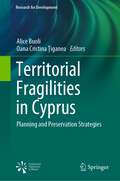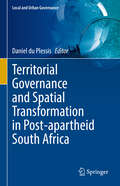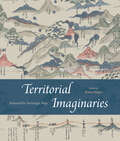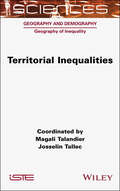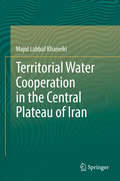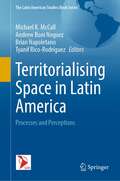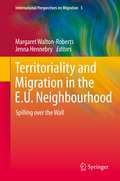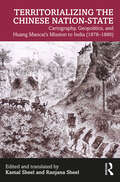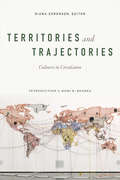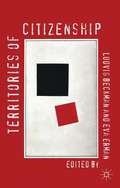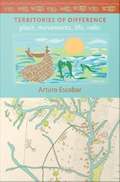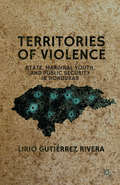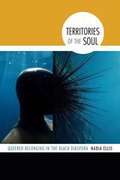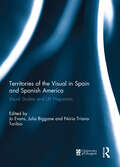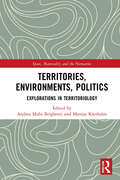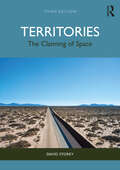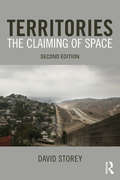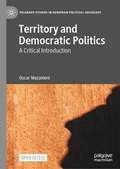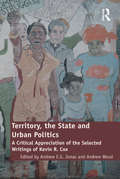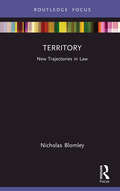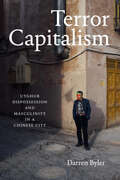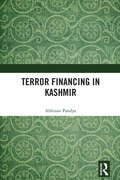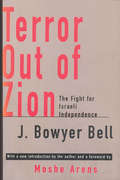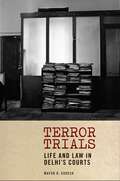- Table View
- List View
Territorial Fragilities in Cyprus: Planning and Preservation Strategies (Research for Development)
by Alice Buoli Oana Cristina ŢiganeaIn this book, the authors present a combination of research-by-design, place-based, and policy-oriented approaches to the territorial fragilities of Nicosia. Nicosia, in Cyprus, is a city divided. Since 1974, a 180 km long Buffer Zone has separated the Turkish Republic of Northern Cyprus (TRNC) and the Republic of Cyprus (RoC). This "open wound" cuts through the city's historical center, crossing the Venetian walls, a key cultural heritage asset, and impacting the city's spatial and cultural identity. Outcomes of an inter-doctoral research initiative, this edited book documents the local realities of the divided city and tests scenarios and spatial patterns of intervention to cope with the partition through the enhancement of local cultural heritage.The book targets an academic audience, architects, urban planners, heritage preservation professionals and policymakers, providing a transferable research method relevant to those approaching a complex, fragile, and contested "border territory".
Territorial Governance and Spatial Transformation in Post-apartheid South Africa (Local and Urban Governance)
by Daniel Du PlessisThe book provides a reflective account of the evolution of the territorial governance structures and processes in South Africa over a period of 30 years after the transition to a post-apartheid society in 1994. It also considers the role and influence of these changing governance institutions and processes and their associated outputs (in the form of policies and plans) on several priority dimensions of urban spatial transformation. The synthesis of the experiences and lessons learnt provides the bases for contemplating important future focus areas for territorial governance such as spatial transformation towards smart cities, an African perspective for future South African cities, and transitioning towards a streamlined integrated territorial governance system. The lessons and experiences are not only of local significance in South Africa, but also globally in countries and regions faced with territorial governance and spatial transformation challenges.
Territorial Imaginaries: Beyond the Sovereign Map
by Kären WigenFresh offerings on world mapping beyond Western conventions. This strikingly colorful volume contends that modern mapping has never been sufficient to illustrate the complex reality of territory and political sovereignty, whether past or present. For Territorial Imaginaries, editor Kären Wigen has assembled an impressive slate of experts, spanning disciplines from political science to art history, to contribute perspectives and case studies covering three main themes: mapping before the nation-state, rethinking and critiquing mapping practices, and robust traditions of counter-cartography. Each contributor proposes alternative ways to think about mapping, and the essays are supported with rich archival documentation. Among the far-reaching case studies are Barbara Mundy’s cartographic history of Indigenous dispossession in the Americas, Peter Bol’s examination of two Chinese maps created five hundred years apart, and Ali Yaycıoğlu’s exploration of tensions between top-down and bottom-up mapping of Habsburg and Ottoman border claims.
Territorial Inequalities
by Magali Talandier Josselin TallecSpatial planning has embraced the idea of dealing with territorial inequalities by focusing on equipment logic on a national scale, and then economic development on a local scale. Today, this issue is creating new angles of debate with strong political resonances (e.g. Brexit, French gilets jaunes movement). Interpretations of these movements are often quick and binary, such as: the contrast between metropolises and peripheries, between cities and the countryside, between the north and the south or between the east and the west of the European Union. Territorial Inequalities sheds light on the social, political and operational implications of these divergences. The chapters cover the subject at different scales of action and observation (from the neighborhood to the world), but also according to their interdependences. To deal with such a vast and ambitious theme, the preferred approach is that of territorial development in terms of public policy, namely spatial planning.
Territorial Water Cooperation in the Central Plateau of Iran
by Majid Labbaf KhaneikiThis book tries to answer the question how different communities in such an arid area as the Iranian central plateau could have shared their limited water resources in a perfect harmony and peace over the course of history. They invented some indigenous technologies as well as cooperative socio-economic systems in order to better adapt themselves to their harsh environment where the scarce water resources had to be rationed among the different communities as sustainably as possible. Those stories hold some lessons for us on how to adjust our needs to our geographical possibilities while living side by side with other people. This work gives insight into the indigenous adaptation strategies through the territorial water cooperation, and describes how water can appear as a ground for cooperation. It explains the water supply systems and social aspects of water in central Iran. Topics include the territorial water cooperation, qanat’s, the traditional water management and sustainability, the socio-economic context, the sustainable management of shared aquifers system and more.
Territorialising Space in Latin America: Processes and Perceptions (The Latin American Studies Book Series)
by Michael K. McCall Andrew Boni Noguez Brian Napoletano Tyanif Rico-RodríguezThe vision of this book is to bring together examples of grounded geographic research carried out in Latin America regarding territorial processes. These encompass a range of histories, processes, strategies and mechanisms, with case studies from ten countries and many regions: struggles to reclaim indigenous lands, conflicts over land/resource/environmental services, competing land claims, urban territorial identities, state power strategies, commercial involvements and others. The case studies included in the book represent a wide diversity of theoretical and methodological framings currently deployed in Latin America to help interpret the patterns and processes through the conceptual lenses of territory, territoriality and territorialization. Interrogating the meanings of territory introduces multiple spatial, socio-cultural and political concepts including space, place and landscape, power, control and governance, and identity and gender.
Territoriality and Migration in the E.U. Neighbourhood: Spilling over the Wall
by Margaret Walton-Roberts Jenna HennebryThis volume brings together an interdisciplinary group of scholars around an important question: how has migration changed in Europe as the European Union has enlarged, and what are the consequences for countries (and for migrants themselves) inside and outside of these redrawn jurisdictional and territorial borders? By addressing this question the book contributes to three current debates with respect to EU migration management: 1) that recent developments in EU migration management represent a profound spatial and organizational reconfiguration of the regional governance of migration, 2) the trend towards the externalization or subcontracting of migration control and, 3) how the implications of Europe's changing immigration policy are increasingly felt across the European neighborhood and beyond. Based on new empirical research, the authors in this collection explore these three processes and their consequences for both member and non-member EU states, for migrants themselves, and for migration systems in the region. The collection indicates that despite the rhetoric of social and spatial integration across the EU region, as one wall has come down, new walls have gone up as novel migration and security policy frameworks have been erected - making European immigration more complex, and potentially more influential beyond the EU zone, than ever.
Territorializing the Chinese Nation-State: Cartography, Geopolitics, and Huang Maocai's Mission to India (1878–1880)
by Kamal Sheel and Ranjana SheelThis book is the first annotated translation of the travelogues of Huang Maocai. A trained Chinese cartographer in the service of the imperial Qing state, he was officially deputed to ascertain the Tibet–India land route and the geopolitical status of British India in the nineteenth century. His travelogues are the first authoritative modern Chinese texts exploring the physical and ideological connections between China and India. Unpublished for a long time, and so far, unavailable in an English translation, these texts provide meaning to many key issues that enshroud the concepts of civilization and nation.An important contribution to the study of Sino–Indian interactions, it demonstrates Huang Maocai's keen observation of the geopolitics of the region. His vivid descriptions of Kolkata and nearby regions enlighten the Chinese perception of colonial India. This book will be an indispensable resource for students and researchers of nation, nationalism, civilization, empire, frontiers and borders, modern history, translation studies, Chinese studies, and Asian studies.
Territories and Trajectories: Cultures in Circulation
by Homi K. Bhabha Diana SorensenThe contributors to Territories and Trajectories propose a model of cultural production and transmission based on the global diffusion, circulation, and exchange of people, things, and ideas across time and space. This model eschews a static, geographically bounded notion of cultural origins and authenticity, privileging instead a mobility of culture that shapes and is shaped by geographic spaces. Reading a diverse array of texts and objects, from Ethiopian song and ancient Chinese travel writing to Japanese literature and aerial and nautical images of the Indian Ocean, the contributors decenter national borders to examine global flows of culture and the relationship between thinking at transnational and local scales. Throughout, they make a case for methods of inquiry that encourage innovative understandings of borders, oceans, and territories and that transgress disciplinary divides. Contributors. Homi Bhabha, Jacqueline Bhabha, Lindsay Bremner, Finbarr Barry Flood, Rosario Hubert, Alina Payne, Kay Kaufman Shelemay, Shu-mei Shih, Diana Sorensen, Karen Thornber, Xiaofei Tian
Territories of Citizenship
by Eva Erman Ludvig BeckmanA comprehensive exploration of theories of citizenship and inclusiveness in an age of globalization. The authors analyze democracy and the political community in a transnational context, using new critical, conceptual and normative perspectives on the borders, territories and political agents of the state.
Territories of Difference: Place, Movements, Life, Redes
by Arturo EscobarIn Territories of Difference, Arturo Escobar, author of the widely debated book Encountering Development, analyzes the politics of difference enacted by specific place-based ethnic and environmental movements in the context of neoliberal globalization. His analysis is based on his many years of engagement with a group of Afro-Colombian activists of Colombia's Pacific rainforest region, the Proceso de Comunidades Negras (PCN). Escobar offers a detailed ethnographic account of PCN's visions, strategies, and practices, and he chronicles and analyzes the movement's struggles for autonomy, territory, justice, and cultural recognition. Yet he also does much more. Consistently emphasizing the value of local activist knowledge for both understanding and social action and drawing on multiple strands of critical scholarship, Escobar proposes new ways for scholars and activists to examine and apprehend the momentous, complex processes engulfing regions such as the Colombian Pacific today. Escobar illuminates many interrelated dynamics, including the Colombian government's policies of development and pluralism that created conditions for the emergence of black and indigenous social movements and those movements' efforts to steer the region in particular directions. He examines attempts by capitalists to appropriate the rainforest and extract resources, by developers to set the region on the path of modernist progress, and by biologists and others to defend this incredibly rich biodiversity "hot-spot" from the most predatory activities of capitalists and developers. He also looks at the attempts of academics, activists, and intellectuals to understand all of these complicated processes. Territories of Difference is Escobar's effort to think with Afro-Colombian intellectual-activists who aim to move beyond the limits of Eurocentric paradigms as they confront the ravages of neoliberal globalization and seek to defend their place-based cultures and territories.
Territories of Violence
by Lirio Gutiérrez RiveraThis book examines the persistence of social violence and public insecurity in Honduras. Using a spatial perspective, the author looks at the Honduran state's security polices - known as Mano Dura - and the challenges authorities face. She points to the state's historical difficulty producing and ordering political territory and space.
Territories of the Soul: Queered Belonging in the Black Diaspora
by Nadia EllisNadia Ellis attends to African diasporic belonging as it comes into being through black expressive culture. Living in the diaspora, Ellis asserts, means existing between claims to land and imaginative flights unmoored from the earth--that is, to live within the territories of the soul. Drawing on the work of Jose Muñoz, Ellis connects queerness' utopian potential with diasporic aesthetics. Occupying the territory of the soul, being neither here nor there, creates in diasporic subjects feelings of loss, desire, and a sensation of a pull from elsewhere. Ellis locates these phenomena in the works of C.L.R. James, the testy encounter between George Lamming and James Baldwin at the 1956 Congress of Negro Artists and Writers in Paris, the elusiveness of the queer diasporic subject in Andrew Salkey's novel Escape to an Autumn Pavement, and the trope of spirit possession in Nathaniel Mackey's writing and Burning Spear's reggae. Ellis' use of queer and affect theory shows how geographies claim diasporic subjects in ways that nationalist or masculinist tropes can never fully capture. Diaspora, Ellis concludes, is best understood as a mode of feeling and belonging, one fundamentally shaped by the experience of loss.
Territories of the Visual in Spain and Spanish America: Visual Studies and UK Hispanism
by Jo Evans, Julia Biggane and Nuria Triana-ToribioWhile studying the theory and contemporary impact of ‘embodied’ viewing, this book celebrates the emergence and development of Visual Studies as a major subject of research and teaching in the field of Hispanic Studies within the UK over the last thirty years. By exploring current routes of investigation, as well as analysing future pathways for study in the field, seven highly distinguished Spanish and Latin American scholars examine their own entry into Visual Studies, and discuss the major trends and changes which occurred in the field as matters of the visual gradually became embedded in higher-education curricula and research trajectories. Each scholar also lays out a current research project, or interest, concerning Spain or Latin America within the visual field. The projects variously explore different media – including film, sculpture, photography, dance, and performance art – spread across a wide array of geographical locales, including Mexico, Cuba, mainland Spain, and the Canary Islands. Offering a map of current and future research in the field, this book provides the first history of visual studies within UK Hispanism. It will be of lasting value to a wide range of scholars and advanced students of Spanish and Latin American cultural, visual, and film studies. This book was originally published as a special issue of the Bulletin of Spanish Studies.
Territories, Environments, Politics: Explorations in Territoriology
by Andrea Mubi BrighentiThis collection seeks to illustrate the state of the art in territoriological research, both empirical and theoretical. The volume gathers together a series of original, previously unpublished essays exploring the newly emerging territorial formations in culture, politics and society. While the globalisation debate of the 1990s largely pivoted around a ‘general deterritorialisation’ hypothesis, since the 2000s it has become apparent that, rather than effacing territories, global connections are added to them, and represent a further factor in the increase of territorial complexity. Key questions follow, such as: How can we further the knowledge around territorial complexities and the ways in which different processes of territorialisation co-exist and interact, integrating scientific advances from a plurality of disciplines? Where and what forms does territorial complexity assume, and how do complex territories operate in specific instances? Which technological, political and cultural facets of territories should be tackled to make sense of the life of territories? How and by what different or combined methods can we describe territories, and do justice to their articulations and meanings? How can the territoriological vocabulary relate to contemporary social theory advancements such as ANT, the ontological turn, the mobilities paradigm, sensory urbanism, and atmospheres research? How can territorial phenomena be studied across disciplinary boundaries? Territories, Environments, Politics casts a fresh perspective onto a number of key contemporary socio-spatial phenomena. Refraining from the attempt to ossify territoriology into some disciplinary straightjacket, the collection aims to illustrate the scope of current territoriological research, its domain, its promises, its theoretical advancements, and its methodological reflection in the making. Scholars interested in social research will find in this collection a rich and imaginative theoretical-methodological toolkit. Students in human geography, anthropology and sociology, socio-legal studies, architecture and urban planning will find Territories, Environments, Politics of interest.
Territories: The Claiming of Space
by David StoreyTerritories are more than simply bounded spaces; they reflect the ways in which we think of geographic space. Territoriality, or laying claim to territory, can be seen as the spatial expression of power, with borders dividing those inside from those outside. The book provides an introduction to the concept of territory, the ways in which ideologies and social practices are manifested in space, the deployment of territorial strategies and the geographical outcomes of these.This revised and updated third edition focuses on both macro-scale examples and those less obvious micro-scale ones, and it explores how territorial strategies are used in the maintaining of power, or as a means of resistance. Throughout the book, key questions emerge concerning geographic space. Who is "allowed" to be in particular spaces and who is excluded or discouraged from being there? How are territorial practices utilised in conflicts concerned with socio-political power and identity and how are ideologies transposed onto space?Written from a geographical perspective, the book is interdisciplinary, drawing on ideas and material from a range of academic disciplines including history, political science, sociology, international relations, and cultural studies. Theoretical underpinnings are supported by a variety of historical and contemporary examples, drawn from a range of geographic contexts.
Territories: The Claiming of Space (Elgar Research Agendas Ser.)
by David StoreyPolitics and political relationships underpin the world we live in. From the division of the earth’s surface into separate states to the placement of ‘keep out’ signs, territorial strategies to control geographic space can be used to assert, maintain or resist power and as a force for oppression or liberation. Forms of exclusion can be consolidated and reinforced through territorial practices, yet they can also be resisted through similar means. Territoriality can be seen as the spatial expression of power, with borders dividing those inside from those outside. The extensively revised and updated second edition continues to provide an introduction to theories of territoriality and the outcomes of territorial control and resistance. It explores the construction of territories and the conflicts which often result using a range of examples drawn from various spatial scales and from many different countries. It ranges in coverage from conflicts over national territory (such as Israel/Palestine, Northern Ireland, South Ossetia) to divisions of space based around class, gender and race. While retaining the key elements of the first edition, this new edition covers contemporary debates on nationalism, territorialization, globalization and borders. It updates the factual content to explore the territorial consequences of ‘9/11’, the ‘war on terror’ and the conflicts in Iraq and Afghanistan. It also examines migration, refugees, the territorial expansion of the European Union, and territorial divisions in the home and workplace. The book emphasizes the underlying processes associated with territorial strategies and raises important questions relating to place, culture and identity. Key questions emerge concerning geographic space, who is ‘allowed’ to be in particular spaces and who is barred, discouraged or excluded. Written from a geographical perspective, the book is inter-disciplinary, drawing on ideas and material from a range of academic disciplines including, history, political science, sociology, international relations, cultural studies. Each chapter contains boxed case studies, illustrations and guides to further reading.
Territory and Democratic Politics: A Critical Introduction (Palgrave Studies in European Political Sociology)
by Oscar MazzoleniThe book provides a comprehensive and updated introduction to concept of territory in the study of democratic politics. Territory plays a rather marginal role in the traditional conceptions of democracy that in many ways still prevail today. Democratic politics is often analysed from the point of view of its institutions, citizens and voters, while little is said about the territory through which it is expressed – at most it provides a broader perimeter or context of political and institutional action. The book offers, instead, an introductory theoretically-oriented discussion of crucial issues such as the genesis of state-nation, the transformation of democratic citizenship, the current borders’ policies, the rising of territorial populism and the experience of 19-covid pandemic.This is an open access book.
Territory, the State and Urban Politics: A Critical Appreciation of the Selected Writings of Kevin R. Cox
by Andrew WoodFollowing its rise to prominence in the 1990s work on territory, the state and urban politics continues to be a vibrant and dynamic area of academic concern. Focusing heavily on the work of one key influential figure in the development of the field - Kevin R. Cox - this volume draws together a collection of prominent and well established scholars to reflect on the development and state of the field and to establish a research agenda for future work.
Territory: New Trajectories in Law (New Trajectories in Law)
by Nicholas BlomleyThis book introduces readers to the concept of territory as it applies to law while demonstrating the particular work that territory does in organizing property relations. Territories can be found in all societies and at all scales, although they take different forms. The concern here is on the use of territories in organizing legal relations. Law, as a form of power, often works through a variety of territorial strategies, serving multiple legal functions, such as attempts at creating forms of desired behaviour. Landed property, in Western society, is often highly territorial, reliant on sharply policed borders and spatial exclusion. But rather than thinking of territory as obvious and given or as a natural phenomenon, this book focuses particularly on its relation to property to argue that territory is both a social product, and a specific technology that organizes social relations. That is: territory is not simply an outcome of property relations but a strategic means by which such relations are communicated, imagined, legitimized, enforced, naturalized and contested. Accessible to students, this book will be of interest to those working in the areas of sociolegal studies, geography, urban studies, and politics.
Terror Capitalism: Uyghur Dispossession and Masculinity in a Chinese City
by Darren BylerIn Terror Capitalism anthropologist Darren Byler theorizes the contemporary Chinese colonization of the Uyghur Muslim minority group in the northwest autonomous region of Xinjiang. He shows that the mass detention of over one million Uyghurs in “reeducation camps” is part of processes of resource extraction in Uyghur lands that have led to what he calls terror capitalism—a configuration of ethnoracialization, surveillance, and mass detention that in this case promotes settler colonialism. Drawing on ethnographic fieldwork in the regional capital Ürümchi, Byler shows how media infrastructures, the state’s enforcement of “Chinese” cultural values, and the influx of Han Chinese settlers contribute to Uyghur dispossession and their expulsion from the city. He particularly attends to the experiences of young Uyghur men—who are the primary target of state violence—and how they develop masculinities and homosocial friendships to protect themselves against gendered, ethnoracial, and economic violence. By tracing the political and economic stakes of Uyghur colonization, Byler demonstrates that state-directed capitalist dispossession is coconstructed with a colonial relation of domination.
Terror Financing in Kashmir
by Abhinav PandyaThis book analyses the layered and complex web of terror financing in Kashmir. It examines the role of multiple actors — including formal and informal, state and non-state, profit and non-profit, and local and international — to delineate the various strands of an intricate financial system. It shows how, over time, these sophisticated networks have largely remained elusive to Indian counter-terrorism agencies and the need for a specialised and focused effort to understand it. Drawing on interviews with confidential sources within terror networks, as well as inputs and intel from security agencies on the ground, the author lays the groundwork for a robust counter-terrorism strategy in Kashmir. This book will be a must read for professionals and researchers in security studies, military and strategic studies, politics and international relations, and South Asian studies.
Terror Financing in Kashmir
by Abhinav PandyaThis book analyses the layered and complex web of terror financing in Kashmir. It examines the role of multiple actors — including formal and informal, state and non-state, profit and non-profit, and local and international — to delineate the various strands of an intricate financial system. It shows how, over time, these sophisticated networks have largely remained elusive to Indian counter-terrorism agencies and the need for a specialised and focused effort to understand it.Drawing on interviews with confidential sources within terror networks, as well as inputs and intel from security agencies on the ground, the author lays the groundwork for a robust counter-terrorism strategy in Kashmir. This book will be a must read for professionals and researchers in security studies, military and strategic studies, politics and international relations, and South Asian studies.
Terror Out of Zion: Fight for Israeli Independence
by J. Bowyer BellWe fight, therefore we are. This revision of Cartesian wisdom was enunciated by the late premier of Israel, Menachim Begin. It is the leitmotif of this brilliant study of the military origins of modern Israel. J. Bowyer Bell argues that the members of Irgun, Lehi (the Stern Gang), and the Zionist underground in British mandated Palestine had clear motives for the violent path they took: the creation of a sovereign homeland for the Jewish people in oppressed lands. These advocates of terror pitted themselves against not only the British and the Arabs, but also against less violent brethren like Ben Gurion, Moshe Dayan, and Yitzhak Rabin.This is the definitive story of desperate, dedicated revolutionaries who were driven to conclude that lives must be taken if Israel were to live. The dynamite bombing of the King David Hotel, the assassination of Lord Moyne in Cairo, and Count Bernardotte ,in Palestine were but a few acts of terror which forced the British out of the Middle East. Terror Out of Zion evaluates whether these acts were extremist or necessary, and whether these men and women were fanatics or freedom fighters.Terror Out of Zion serves as a primer for those who would understand contemporary political divisions in Israel. It is based on careful historical research and interviews with surviving members of the Irgun, chronicling bombings, assassinations, hah- breadth prison escapes, and endless cycles of retaliation in the terror that gave birth to Israel, but, no less, continues to inform its political relations. Bell has fashioned an adventure story that also explains the sources of current tensions and frictions within Israel.Publishers' Weekly wrote that Bell's book crackles with suspense and explodes with tales of carnage and violence; it could hardly be otherwise. Yet he writes with compassion and insight into the black despair that engendered the terrorist's brutal deeds. And a highly laudat
Terror Trials: Life and Law in Delhi's Courts (Thinking from Elsewhere)
by Mayur R. SureshHonorable Mention, Bernard S. Cohn Book PrizeAn ethnography of terrorism trials in Delhi, India, this book explores what modes of life are made possible in the everyday experience of the courtroom. Mayur Suresh shows how legal procedures and technicalities become the modes through which courtrooms are made habitable. Where India’s terror trials have come to be understood by way of the expansion of the security state and displays of Hindu nationalism, Suresh elaborates how they are experienced by defendants in a quite different way, through a minute engagement with legal technicalities.Amidst the grinding terror trials—which are replete with stories of torture, illegal detention and fabricated charges—defendants school themselves in legal procedures, became adept petition writers, build friendships with police officials, cultivate cautious faith in the courts and express a deep sense of betrayal when this trust is belied. Though seemingly mundane, legal technicalities are fraught and highly contested, and acquire urgent ethical qualities in the life of a trial: the file becomes a space in which the world can be made or unmade, the petition a way of imagining a future, and investigative and courtroom procedures enable the unexpected formation of close relationships between police and terror-accused.In attending to the ways in which legal technicalities are made to work in everyday interactions among lawyers, judges, accused terrorists, and police, Suresh shows how human expressiveness, creativity and vulnerability emerge through the law.
